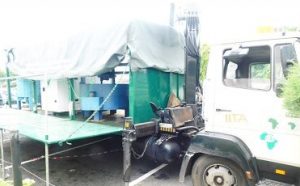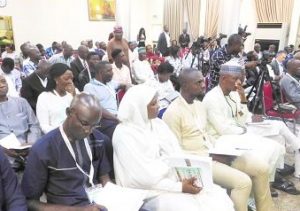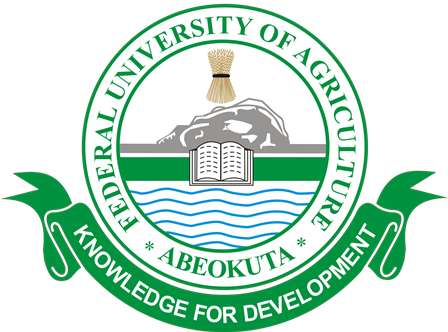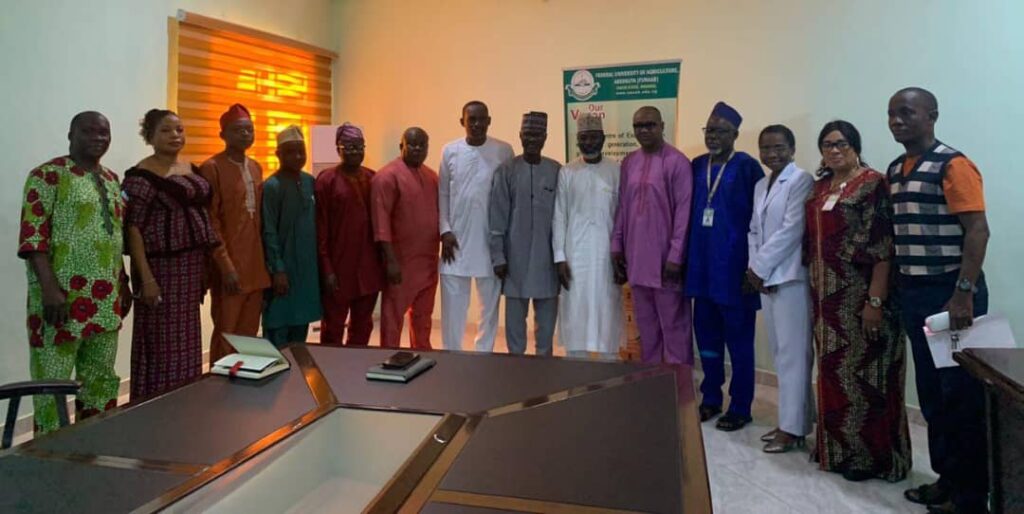The Vice-Chancellor, Professor Kolawole Salako has stated that he is an investment of the International Institute of Tropical Agriculture (IITA), in the Federal University of Agriculture, Abeokuta (FUNAAB).
The Vice-Chancellor who stated this at the 2-Day 2019 Cassava Investment Forum themed, “Reviewing the Past and Understanding the Best Business Practices for a Brighter Future”, organised by the Technologies for African Agricultural Transformation (TAAT), in conjunction with FUNAAB, African Development Bank (AfDB), African Development Fund (ADB) and IITA. According to the Vice-Chancellor, he said that he spent a whopping 11 years in IITA as a Scientist before coming to FUNAAB, stating that IITA is a reputable organisation whose main priority is to enhance food and nutrition security for sub-Saharan Africa.

Prof. Salako who paid glowing tributes to some of his senior colleagues present at the Forum, added that IITA is an ideal place for scientists to thrive as researchers, noting that the Deputy Vice-Chancellor in charge of Development is also an investment of IITA in FUNAAB.
While welcoming the dignitaries to the event involving all cassava stakeholders in the country, the Vice-Chancellor stated that most experts are developing productive partnerships that would jumpstart the nation’s agricultural revolution with the alignment of principle of sustainable development and economic growth.
According to him, “Nigeria grows about 54 million Metric Tonnes of cassava per year. Cassava is a versatile commodity with numerous uses and by-products. For instance, Starch companies have recently established deal to supply cassava starch to Nestle, Cadbury, Unilever, and so on. Unfortunately, most of them are only running at around 50 percent capacities, less than 50,000 tons of starch per annum.”
Professor Salako stressed that the demand for starch was expected to continue growing at five percent yearly in total demand, noting that this would put the total demand for starch at 357,000 Metric Tonnes by 2020, especially as more companies are seeking to establish local production lines to service the expanding Nigerian and West African Markets. He added that sorbitol for toothpaste, sugar-syrups and sweeteners are all products from starch.
Commenting on the nation’s net imports for ethanol which stood at 300 to 350 million litres per annum, Professor Salako noted that Nigeria was unable to produce 30 million litres, creating a gap for further national investment instead of imports. He, however, encouraged the participants to transform the nation’s agricultural system to a robust economic base using cassava with steady and unhindered investment for ethanol, starch as well as high quality cassava industries in Nigeria.
Professor Salako therefore sought the cooperation of the participants to deliberate on how best to learn from past experiences and use the cassava value chain to unlock further opportunities for millions of farmers and contribute to food security, job creation and incomes, especially for women and young people in Nigeria.
Reiterating the call that FUNAAB would continue to strengthen the national and regional support for the production of high quality foods, the Vice-Chancellor said that the University was determined to achieve safe and wholesome products to Nigerians as well as ensure sustainable manpower development through effective Partnerships.

In his Keynote Address, the Permanent Secretary, Ministry of Agriculture and Rural Development (FMARD), Dr. Mohammed Umar said that the Ministry in collaboration with the organisers of the forum, the University and Cassava Adding Value for Africa (FUNAAB/CAVA) have trained master bakers on the promotion and adoption of 20 per cent cassava bread.
The Permanent Secretary who was represented by the Head, Root and Tuber Crops in the Ministry, Mr Ayodeji Bobby, further stated that provision has been made to equip FUNAAB’s Tissue Culture Laboratory with modern equipment to enhance rapid provision of quality and disease resistant cassava planting materials.
The Permanent Secretary noted that Nigeria remained the largest producer of cassava, adding that a total of 36.8 million Metric Tons of cassava were harvested from 3.13 million hectares in 2013. According to him, this was with an average yield of 11.7 Tons per hectare which was an insignificant fraction of global value-addition of cassava.
He, therefore, stressed that because of the Federal Government’s support through the Change Agenda of the Government the production was raised to about 54 Million Metric Tons at 15 Tons per hectare and developed efficient value-added chains.
Earlier in his Opening Remark, the Director for Development and Delivery at IITA, Dr. Alfred Dixon, said that Nigeria’s cassava annual production was above 50 Million Tones, adding that the increase from 35 million Tons in the early 1990s was not accidental.
Popularly known as ‘Baba Cassava’ by his admirers, Dr. Dixon stated that this resulted from efforts of stakeholders in research and development in all aspects of cassava value chain, including processing, mechanisation and markets.
Dr. Dixon said that in spite of the achievement of having more than 50 million Tonnes annual production, there were still some challenges confronting the cassava crop, thereby calling for solutions from the Forum.
Present at the forum were Executive Director, National Root Crops Research Institute (NRCRI), Dr. Joseph Ukpabi; Representative of the Acting DG, Federal Institute of Industrial Research (FIIRO); Mr. Ebrima Faal of the African Development Bank (AfDB); TAAT Program Coordinator in IITA, Dr. Chrys Akem; TAAT Cassava Compact Leader in IITA, Dr. Adebayo Abass; Head, TAAT Clearing House, Dr. Mpoko Bokanga; Senior Technology Adviser on Agriculture and Food Security, HEVP, Dr. Andrew Kwasari and the Deputy Vice-Chancellor, (Development), who is also the Co-convener TAAT-FUNAAB Compact, Professor Lateef Sanni.









